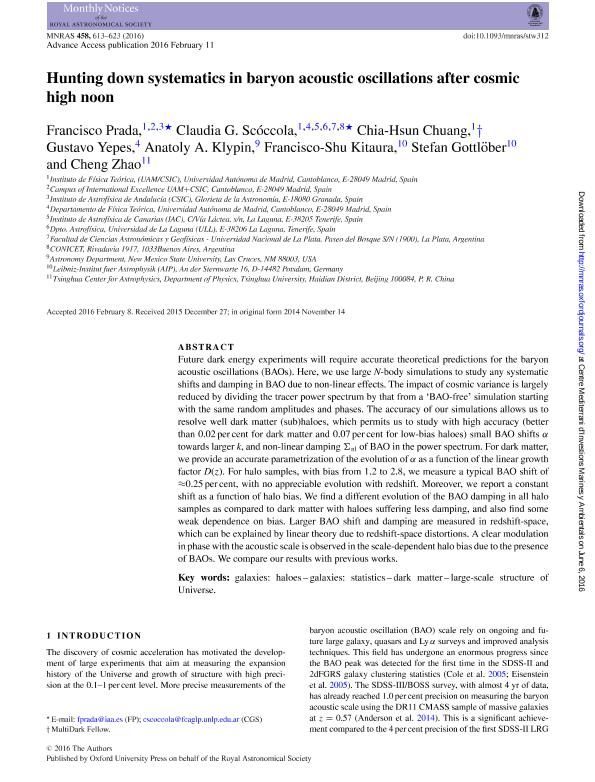Artículo
Hunting down systematics in baryon acoustic oscillations after cosmic high noon
Prada, Francisco; Scoccola, Claudia Graciela ; Chuang, Chia-Hsun; Yepes, Gustavo; Klypin, Anatoly A.; Kitaura, Francisco-Shu; Gottlöber, Stefan; Zhao, Cheng
; Chuang, Chia-Hsun; Yepes, Gustavo; Klypin, Anatoly A.; Kitaura, Francisco-Shu; Gottlöber, Stefan; Zhao, Cheng
 ; Chuang, Chia-Hsun; Yepes, Gustavo; Klypin, Anatoly A.; Kitaura, Francisco-Shu; Gottlöber, Stefan; Zhao, Cheng
; Chuang, Chia-Hsun; Yepes, Gustavo; Klypin, Anatoly A.; Kitaura, Francisco-Shu; Gottlöber, Stefan; Zhao, Cheng
Fecha de publicación:
02/2016
Editorial:
Wiley Blackwell Publishing, Inc
Revista:
Monthly Notices of the Royal Astronomical Society
ISSN:
0035-8711
Idioma:
Inglés
Tipo de recurso:
Artículo publicado
Clasificación temática:
Resumen
Future dark energy experiments will require accurate theoretical predictions for the baryon acoustic oscillations (BAOs). Here, we use large N-body simulations to study any systematic shifts and damping in BAO due to non-linear effects. The impact of cosmic variance is largely reduced by dividing the tracer power spectrum by that from a 'BAO-free' simulation starting with the same random amplitudes and phases. The accuracy of our simulations allows us to resolve well dark matter (sub)haloes, which permits us to study with high accuracy (better than 0.02 per cent for dark matter and 0.07 per cent for low-bias haloes) small BAO shifts α towards larger k, and non-linear damping σnl of BAO in the power spectrum. For dark matter, we provide an accurate parametrization of the evolution of α as a function of the linear growth factor D(z). For halo samples, with bias from 1.2 to 2.8, we measure a typical BAO shift of ≈0.25 per cent, with no appreciable evolution with redshift. Moreover, we report a constant shift as a function of halo bias. We find a different evolution of the BAO damping in all halo samples as compared to dark matter with haloes suffering less damping, and also find some weak dependence on bias. Larger BAO shift and damping are measured in redshift-space, which can be explained by linear theory due to redshift-space distortions. A clear modulation in phase with the acoustic scale is observed in the scale-dependent halo bias due to the presence of BAOs. We compare our results with previous works.
Archivos asociados
Licencia
Identificadores
Colecciones
Articulos(CCT - LA PLATA)
Articulos de CTRO.CIENTIFICO TECNOL.CONICET - LA PLATA
Articulos de CTRO.CIENTIFICO TECNOL.CONICET - LA PLATA
Citación
Prada, Francisco; Scoccola, Claudia Graciela; Chuang, Chia-Hsun; Yepes, Gustavo; Klypin, Anatoly A.; et al.; Hunting down systematics in baryon acoustic oscillations after cosmic high noon; Wiley Blackwell Publishing, Inc; Monthly Notices of the Royal Astronomical Society; 458; 1; 2-2016; 613-623
Compartir
Altmétricas



